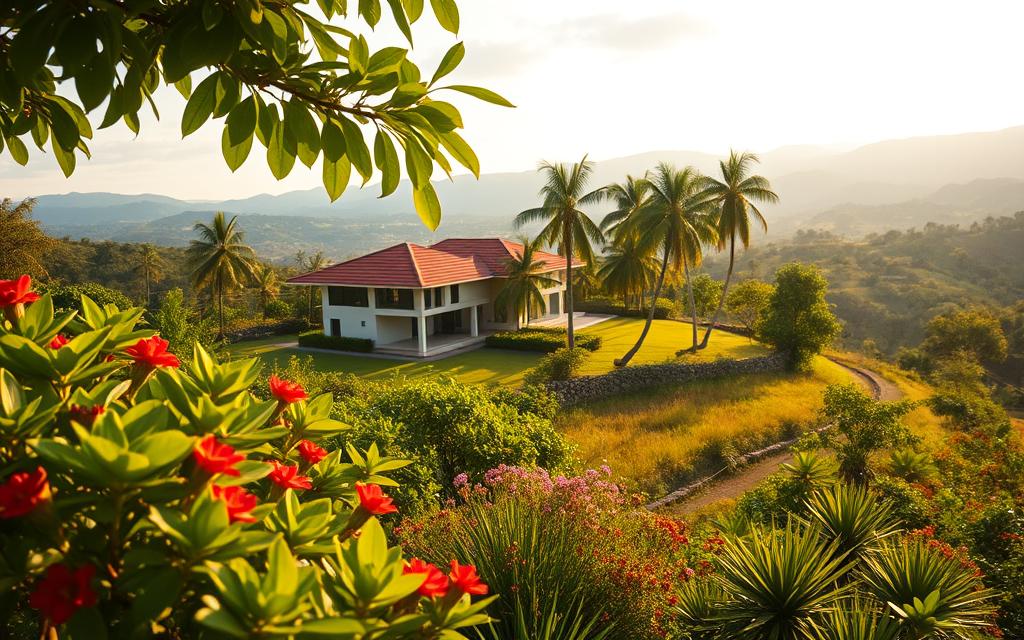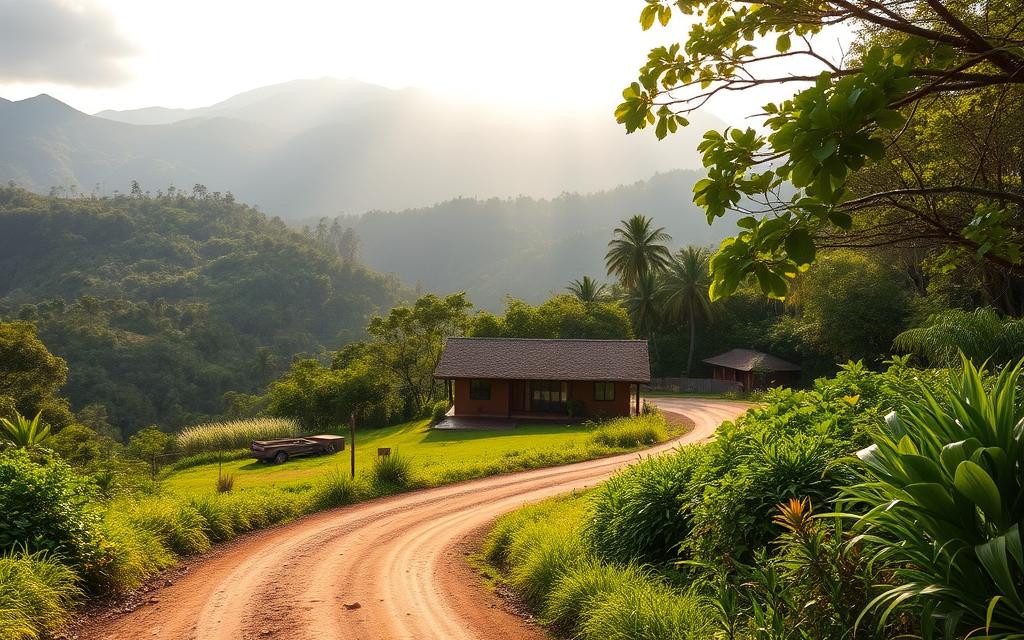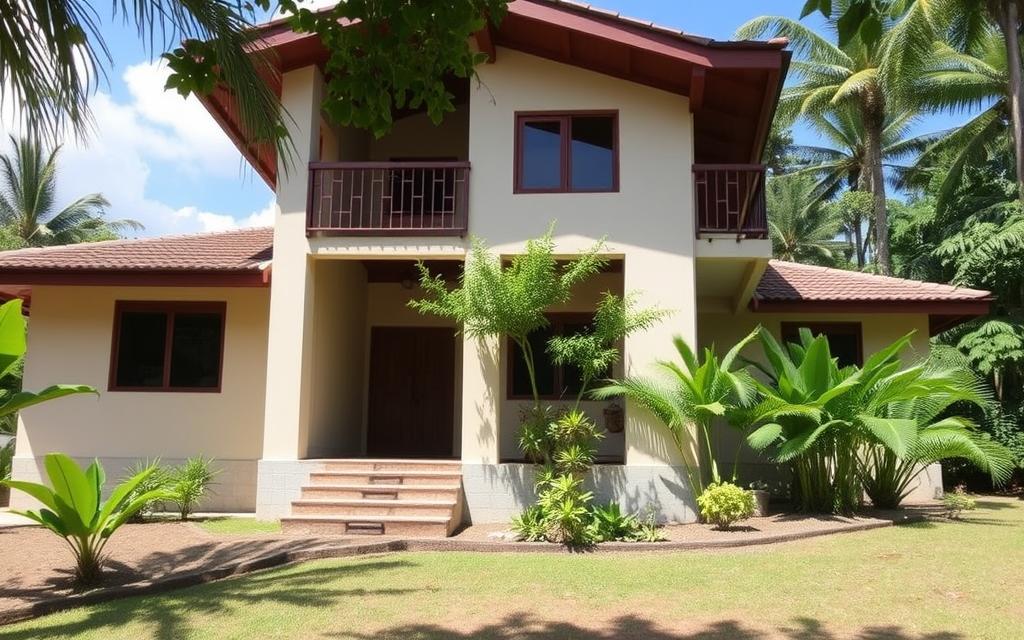Explore financing-options-for-costa-rica-real-estate with competitive rates and flexible loan terms. We connect borrowers with private investors, simplifying the process.

Get Loans for Land Purchases in Costa Rica (Even for Expats)
Thinking of buying property in Costa Rica? Securing financing can be challenging, especially for foreigners. Traditional banking often involves complex bureaucracy and high interest rates, making the process frustrating.
At Gap Equity Loans, we simplify the process by connecting borrowers with private investors and lenders who understand the unique needs of expats. Using your existing Costa Rican property as collateral can unlock significant funding opportunities with more favorable terms. Our equity loan solutions offer competitive rates and flexible terms, making it easier to achieve your investment goals. For more information on the challenges expats face in getting a mortgage in Costa Rica, visit our page on the difficulties expats encounter.
The Challenges of Financing Property in Costa Rica as a Foreigner

Costa Rica’s property financing landscape presents unique obstacles for international buyers. Financing property in this beautiful country can be challenging, especially for those who are not residents.
Traditional Banking Obstacles
Foreign buyers often encounter significant hurdles when seeking traditional financing through Costa Rican banks. The extensive paperwork requirements can be overwhelming, and the approval process can take months, often ending in rejection.
The conservative lending practices of traditional banks in Costa Rica contribute to the country’s financial stability but create challenges for foreign investors. Banks struggle to verify foreign income, employment history, and creditworthiness, adding to the complications.
Documentation and Language Barriers
Language barriers present a major obstacle as all documentation must be submitted in Spanish, requiring official translation services that add time and expense to the process. Documentation requirements include proof of income, banking history, and source of funds, all of which must be officially translated and authenticated.
The bureaucratic process can be particularly frustrating for buyers accustomed to more efficient banking systems in their home countries. Interest rates for foreigners are typically 3-5% higher than comparable loans in North America, with closing costs reaching up to 3% of the loan amount on top of standard closing fees.
Understanding Costa Rica’s Real Estate Market
Understanding the nuances of Costa Rica’s real estate market is crucial for making informed investment decisions. Costa Rica’s property market is characterized by its diversity, offering various opportunities across different price points and property types.
Current Market Trends and Opportunities
The current real estate market in Costa Rica is influenced by location and demand. Popular regions such as Guanacaste and the Central Valley command higher prices due to their desirability. In urban centers, property prices range from $500 to $1,300 per square meter, providing various entry points for investors.
Some key trends in the Costa Rican real estate market include:
- Diverse opportunities across various price points and property types.
- Premium prices in popular regions like Guanacaste and the Central Valley.
- Property prices in urban centers range from $500 to $1,300 per square meter.
Investment Potential for Foreign Buyers
Foreign buyers are drawn to Costa Rica’s political stability, natural beauty, and relatively affordable property prices. Investment returns vary by location, with luxury projects in San Jose yielding around 8.6% ROI, and trendy areas like Santa Ana and Escazu offering about 7.5% returns. Beachfront properties in tourist hotspots can generate rental returns between 12-17%.
The resilience of Costa Rica’s real estate market, even during global economic downturns, adds to its appeal for foreign investors. Understanding local market dynamics is essential for making informed decisions, particularly when seeking financing for land purchases.
Conventional Financing Options in Costa Rica

As a foreign buyer looking to invest in Costa Rica, understanding the conventional financing options available is crucial. Costa Rica’s banking sector has adapted to serve foreign property buyers, with several private banks now offering mortgage solutions.
Local Bank Requirements and Terms
Local banks in Costa Rica, such as Banco Lafise, BAC San José, and BCT, have begun offering mortgages to foreigners. These banks require substantial documentation, including proof of income, banking history, and source of funds. All documentation must be in Spanish, adding to the complexity.
Interest Rates and Down Payment Expectations
Interest rates for U.S. dollar loans range between 8.5% and 10%, while loans in the local currency can have rates up to 20%. Down payments are typically between 30% to 50% of the property value. Careful consideration of the currency choice is essential due to the varying interest rates.
Typical Loan Terms for Foreigners
Loan terms can extend up to 20 years, providing flexibility for buyers. However, the approval process is lengthy, often taking several months. Legal reviews and translation costs should be factored into the overall budget when considering conventional financing options.
Conventional financing through Costa Rican banks requires careful planning and understanding of the terms and requirements. By being aware of the local bank requirements, interest rates, and loan terms, foreign buyers can make informed decisions when investing in Costa Rican property.
Alternative Financing Solutions for Expats
Alternative financing solutions are becoming more popular among expats seeking to invest in Costa Rica. If dealing with a local bank sounds like too much of a headache, you’re not out of luck.

International Mortgage Lenders
A growing number of U.S.- or Canada-based lenders are stepping in with cross-border financing options for vacation homes in Costa Rica. These loans typically come with higher interest rates (9%-12%) and shorter terms (5-15 years) compared to domestic mortgages. However, they offer the advantage of English-language service and familiar processes.
Developer Financing Options
If you’re buying a new condo or property in a gated community, the developer may offer financing options. These deals often resemble owner financing but can include more favorable terms, such as shorter terms (2-5 years), lower down payments, and flexible payment structures.
Using Home Equity from Your Home Country
Using home equity from property in your home country through HELOCs or cash-out refinancing can provide a straightforward funding solution. This approach allows you to tap into the equity of your existing property without navigating Costa Rica’s complex banking system. For more information on financing options in Costa Rica, you can visit GAP Equity Loans.
Each of these alternative financing options comes with its own set of advantages and considerations. It’s essential to carefully evaluate them based on your specific financial situation and investment goals.
Loans for Land Purchases in Costa Rica (Even for Expats)
For expats looking to invest in Costa Rican land, navigating the financing options can be complex, but understanding the process is key. Land loans in Costa Rica operate differently than residential property loans, with specialized financing options available specifically for vacant land purchases.
Eligibility Requirements
Eligibility requirements for land loans typically include proof of income, credit history review, and verification of the land’s title and zoning status to ensure it’s suitable for the intended use. Using existing Costa Rican property as collateral can significantly improve loan terms and increase approval chances for land purchase financing.
Loan-to-Value Ratios
Loan-to-value ratios for land purchases are generally more conservative than for developed properties, typically ranging from 50-70% of the appraised land value. GAP Equity Loans offers specialized land purchase financing with loan amounts ranging from $50,000 to $1,000,000, making it suitable for various land investment strategies. For more insights on using your Costa Rican property as collateral, visit GAP Equity Loans.
Application Process
The application process for foreign buyers involves documentation of income sources, financial history, and detailed information about the land being purchased. Land loans often carry slightly higher interest rates than residential property loans due to the increased risk associated with undeveloped property. Loan terms for land purchases through GAP Equity Loans range from 6 months to 3 years, providing flexibility for buyers with different development or investment timelines.
Interest rates start at 12% and vary based on loan-to-value ratio and other risk factors, offering competitive terms compared to traditional financing options for foreigners. By understanding these aspects, expats can better navigate the process of securing loans for land purchases in Costa Rica.
Introducing GAP Equity Loans: Your Financing Solution
For expats and locals alike, GAP Equity Loans provides an alternative to traditional banking for property financing in Costa Rica. This innovative solution is designed to overcome the common obstacles faced when trying to secure a loan through conventional means.
How GAP Equity Loans Work
GAP Equity Loans works by allowing you to use your existing Costa Rican property as collateral to access funds for land purchases or other investment opportunities. This method eliminates the need to sell your current assets, providing a flexible financing solution.
Loan Terms and Interest Rates
Our loan amounts range from $50,000 to $1,000,000, with interest rates starting at 12% based on the loan-to-value ratio and other risk factors. Loan terms are flexible, ranging from 6 months to 3 years, accommodating various investment strategies.
Benefits of Working with Private Investors
By working with private investors through GAP Equity Loans, you benefit from faster approval processes, more flexible qualification criteria, and personalized service. Unlike traditional banks, our private investors can accommodate unique situations and create customized loan structures.
Using Your Costa Rican Property as Collateral

Using your Costa Rican property as collateral can unlock significant financial opportunities. This approach allows property owners to leverage the value they’ve built in their Costa Rican real estate to fund new land purchases or other investments without selling their current assets.
Leveraging Existing Property for New Purchases
By using your existing Costa Rican property as collateral, you can access equity loans like those offered by GAP Equity Loans. The process involves placing a lien or legal trust against your property, providing security for the lender while maintaining ownership and use of the property. Property valuation is critical, with loan amounts typically ranging from 50-70% of the appraised value.
Legal Considerations and Protections
Costa Rica’s strong mortgage laws provide robust protections for both borrowers and lenders. Legal considerations include proper documentation of the lien, clear terms for release upon loan satisfaction, and protections against unauthorized property transfers. Secure third parties like Secure Title Costa Rica manage these transactions, ensuring all legal requirements are met.
This financing approach is particularly valuable for expats who own property in Costa Rica but face challenges accessing traditional financing for additional investments. By leveraging their existing property, they can access significant funds with an easier qualification process.
The Costs and Legalities of Financing in Costa Rica
Understanding the financial and legal implications of purchasing property in Costa Rica is essential for expats. Financing a property involves various costs and legal considerations.
Closing Costs and Fees
Closing costs in Costa Rica include mortgage registration fees (0.25%), documentary stamps (0.53%), and notary fees (0.50%-1.25% of the mortgage amount). Additional expenses are property appraisal fees ($500-$1,000) and lender administrative fees (1.5% of the loan).
Legal Requirements for Foreign Borrowers
Foreign borrowers must provide proper documentation of income sources, verification of funds, and comply with Costa Rica’s anti-money laundering regulations. Working with specialized lenders can result in lower overall fees and more transparent cost structures.
Conclusion: Securing Your Dream Property in Costa Rica
Securing your dream property in Costa Rica is now more achievable than ever with the right financing options. We simplify the process, connecting borrowers with investors who understand the Costa Rican real estate landscape. GAP Equity Loans offers a compelling alternative to traditional financing, providing expats and foreign investors with access to funds using their existing Costa Rican property as collateral. By leveraging the equity in your property, you can expand your real estate portfolio without navigating complex banking requirements. Visit our website to explore more about our financing solutions and interesting topics related to property investment in Costa Rica.
Article by Glenn Tellier (Founder of CRIE and Grupo Gap)



